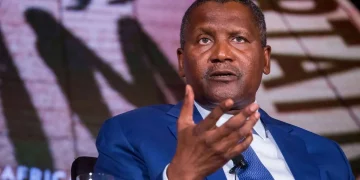Fisayo Soyombo is no stranger to controversy. His investigative works, while often eye-opening, have sometimes been criticized for leaning more toward sensationalism than rigorous journalism. His recent allegations against the Nigeria Customs Service (NCS) regarding rice smuggling at the Idi-Iroko border appear to follow a familiar pattern seen in his recent confrontations with the Nigerian Military over oil bunkering, a case of tarnishing the reputations of high-end performing public stewards. These instances raise questions about the balance between holding institutions accountable and maintaining professionalism.
While his intentions may align with the need for accountability, his approach often raises concerns about sensationalism and a lack of adherence to journalistic ethics. Soyombo’s claims against the NCS are serious, involving accusations of complicity in the smuggling of 1,500 cars loaded with rice. He goes further to name individuals, such as Najeem Akorede, alleging direct involvement in this illegal activity. However, these allegations are not accompanied by the kind of concrete evidence required for such grave assertions. There are no photographic or video recordings, no documented logs of transactions, and no corroborated testimonies from independent sources.
This mirrors his recent confrontation with the Nigerian Military over oil bunkering, where accusations of senior officers’ complicity similarly lacked substantial proof. Relying on unnamed sources and anecdotal evidence for stories of this magnitude undermines their credibility and weakens their impact.
Soyombo’s argument for reopening Nigeria’s borders to rice importation as a solution to smuggling overlooks the complex motivations behind the policy. The Federal Government restricted rice imports to encourage local production, boost food security, and reduce dependency on foreign goods. This policy has led to notable gains:
Between 2015 and 2021, rice production in Nigeria increased from 3.7 million metric tons to over 5.8 million metric tons, according to the Central Bank of Nigeria (CBN).
The number of operational rice mills grew, creating jobs and reducing unemployment in rural areas.
While the policy may have not fully eliminated Nigeria’s reliance on imported rice and has contributed to higher prices, opening the borders indiscriminately would flood the market with cheaper foreign rice, undermining local farmers. Countries like Thailand and India heavily subsidize their rice production, making their exports more competitive. If Nigeria were to reintroduce unrestricted imports, it would reverse years of progress in the agricultural sector.
Also, Soyombo’s commentary on a Customs officer owning Rao International Hotel along a smuggling route reflects another instance of unsubstantiated claims. While public officers must be transparent about their assets, ownership of property is not inherently corrupt. Unless there is evidence that the property was acquired through illicit means or is actively facilitating smuggling, such claims remain speculative.
There is a need for ethical journalism, but Soyombo’s approach raises significant ethical concerns. For example his tweet on X, which read, “At exactly 10:01pm on Tuesday, I tweeted that 1,500 cars containing rice were being moved from Idi-Iroko into Sango and Owode by Adeyemi Habeeb Abdulganiy, the smuggler better known as ‘Abuga’, aided by nobody else other than your men,” reflects the boldness of his accusations but lacks substantiated evidence. This assertion violates the ethical principle of fairness, which requires journalists to avoid making unfounded accusations. The Code of Ethics for Journalists emphasizes the importance of verifying facts and minimizing harm in reporting. If there are legitimate concerns about the officer’s assets, these should be referred to institutions like the Code of Conduct Bureau (CCB) or the Economic and Financial Crimes Commission (EFCC) for thorough investigation.
The ethical responsibility of journalists extends beyond merely exposing wrongdoing; it demands a commitment to fairness, accuracy, and minimizing harm. By naming individuals without indisputable evidence, Soyombo risks tarnishing reputations unfairly and eroding trust in investigative journalism. Furthermore, focusing on individual misconduct without addressing the systemic and structural challenges enabling corruption does little to foster meaningful reform. In the case of the NCS, smuggling is a complex issue exacerbated by porous borders, insufficient manpower, and outdated enforcement technology. Similarly, addressing oil bunkering within the military requires an understanding of the broader networks of criminal actors and their economic drivers.
Soyombo’s approach often sidelines these contextual realities, opting instead for bold accusations that generate public attention but fail to address the root causes of systemic issues.
His reporting also risks creating public cynicism, as sensationalism without substantiation can lead to a lack of trust in both the institutions being accused and the journalists reporting on them. This pattern reflects an approach that prioritizes immediate impact over long-term solutions.
While the fight against corruption and inefficiency in institutions is critical, it must be conducted responsibly. Investigative journalism should expose wrongdoing while providing actionable insights into how reforms can be achieved. Highlighting structural weaknesses, advocating for systemic changes, and collaborating with civil society and policymakers are ways to ensure that such efforts result in tangible improvements. The absence of this balance in Soyombo’s recent work undermines its potential to inspire meaningful change.
It Is crucial for journalists to remember that their work shapes public perception and influences policy discussions. Allegations against national institutions must be presented with rigor and precision, supported by irrefutable evidence. Failure to adhere to these standards not only diminishes the credibility of individual stories but also jeopardizes the integrity of investigative journalism as a whole. In Soyombo’s case, his consistent reliance on sensational claims without adequate proof detracts from the important issues he seeks to address and risks alienating potential allies in the fight for accountability and transparency.
Journalism should aim not just to expose but to educate and inspire reform. By aligning investigative efforts with ethical standards and constructive analysis, the media can fulfill its role as a catalyst for positive change. This balance is essential to restoring trust, driving reform, and ensuring that the fight against corruption achieves lasting results.





